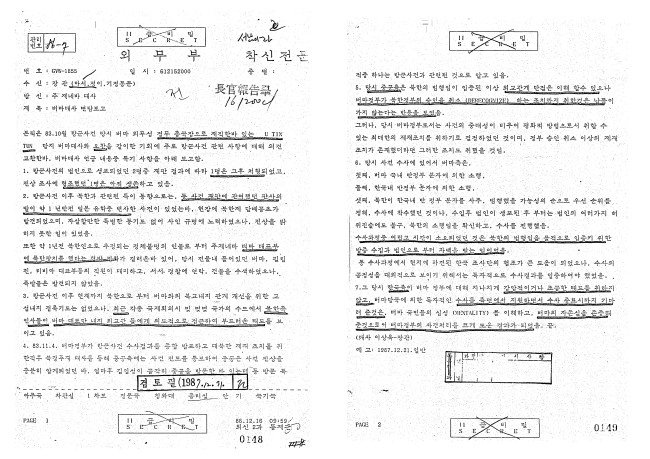Newly released documents reveal that North Korea may have been responsible for the death of a Myanmar woman about two years after the 1983 Rangoon bombing. She was the daughter of the Myanmar judge who sentenced one of the North Korean bombers to death.
The South Korean foreign ministry declassified more than 230,000 documents on April 11. Some of these documents describe a lunch meeting between South Korean ambassador to Geneva Lee Sang-ok and Myanmar ambassador U Thein Tun in 1986.
Following the meeting, Lee wrote in a diplomatic cable: “It was a case that we could not get to the bottom of. Hints of North Korean cigarettes were found at the scene, and the victim did not show any signs of suicidal tendencies prior to her death.”
The woman’s body was discovered in Japan, where she had been studying, in 1985. The documents do not reveal any other circumstances of her death.
In October 1983, three North Korean agents rigged the Martyrs’ Mausoleum in Rangoon with explosives in an attempt to assassinate South Korean president Chun Doo-hwan, who was scheduled to arrive for a ceremony.
President Chun was reportedly stuck in traffic when the bombs went off and avoided harm. However, 17 South Koreans – many high-ranking government officials – and four Myanmar people were killed by the blast. Forty-six others were injured.
Myanmar police apprehended Kim Jin-soo and Kang Min-chul while they were trying to escape by boat on the Yangon River. The third agent was killed in a gunfight.
Kim Jin-soo was sentenced to death and executed in 1984, and Kang Min-chul was sentenced to life in prison after he cooperated with the Burmese investigation. He died from liver cancer in 2008 while being transferred from Insein Prison to a hospital.
The declassified documents also say Myanmar’s mission in Geneva continued to receive bomb threats and that China rebuked Myanmar for ending diplomatic ties with North Korea following the bombing.
The documents explain Myanmar’s response to North Korea and the bombers: “Myanmar found it necessary to prove they were capable of initiating a proper investigation on their own, and as a result, South Korea’s patience with the process was an act of respect for Myanmar’s bruised ego.”



